"The mountains you see on your left are popular with local climbers"
cracked the intercom, as the tour guide gently gestured to her right.
Behind her, images of birds flashed on the video screens, part of a program
about he wildlife in the Peruvian Amazon that had been interrupted by her
announcement. I'm not sure how it happened, but somehow, I had ended up on
a tourist bus. Videos, drink service, a tour guide with microphone, flush
toilettes - these are not trademarks of the adventure travel experience.
But when one has diarreha, and when one has an all day bus ride to look
forward to, having flush toilets makes being subjected to the annoynaces of
a tour bus a worthwhile tradeoff.
I was on my way to Puno, on the shores of Lake Titicaca, in an area
known as the altiplano, or "high plain." The antiplano starts around Cusco
and extends all the way down Bolivia and partially into Chile. At about
13,000 ft, it is notable in its bleakness - wide open fields of grain,
llamas, alpacas, sheep, cows, and not much else. When not taking advantage
of the facilities on the bus, I spent my time chomping on some
unidentifiable chunks of what I think was lamb, bought from an old woman
along the side of the road, who had brusquely cleaved it off of a larger,
unidentifiable mass. My arrival in Puno, the bustling capital of the state
of Puno, was a shocking one. Out of the window of the bus I noticed a man,
down on the ground, his head gushing blood. No one seemed to take the
slilgthest notice. By the time the bus finally stopped and I made my way
back, all that was left was a large pool of blood on the pavement. I
could only hope that he had found help.
Earlier, I had met a woman named Suzanna, and along with Andre, another
man she had met on the bus, we headed out looking for shelter. We found it
at a place called Posada Real, a small but very friendly hostal only a few
minutes away. Thinking that we were "together" as a group, rather than
random strangers who had met a few hours earlier, they offered us all one
room. We exchanged a few confused stares, which only intensified when they
offered us the second option of a single room and a double. Not being sure
of who wanted to share a room with whom and who wanted whom kept out, we
just stood in silence, until Suzanne finally declared that she would take
the single and that we were on our own. They eventually found us a third
room.
Our group started to enlarge, picking up a couple of fellow travelers
from the hostal. Soon, we were a full blown tourist group. So off we went
to do what tourist groups do - find pizza. We found it; Puno was littered
with restaurants eager to pleast the Western palate. I opted for trout,
which was a local specialty from the lake, and finished it off with
"chocolate cake," whose only claim to chocolate was the thin layer of chocolate
sputtered on the outside.
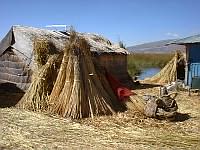 |
Reed stacks
Uros, Puno Peru(31Mayb00) |
For the following day, the rest of the group was joining a multi-day
tour to several of the nearby islands, but I decided to head out on my own
and try to catch a local boat to Uros, islands made up of floating reeds. Once
a testament to mankind's ability to survive in unlikely places, the islands
have become a caricature of themselves. Uros is a collection of tiny
islands made up of floating heaps of reeds farmed from the lake. An entire
culture evolved on the islands, surviving from fishing and hunting of
birds, but now they are simply floating tourist stalls. Since the only
reason to go to the islands is tourism, even the local boats are full of
tourists - local tourists. I ended up on a boat with about five Peruvian
tourists, visiting from nothern Peru. We hopped through about five islands
in two hours - some are only 50ft in diameter, and the venders pushed their
wares. I wasn´t buying, but my Peruvian friends were; sweaters, bowls,
even a stuffed duck. I would just walk around, watching the reeds gently sink
with each step, trying to keep from walking into a soft spot in the reeds
and sinking.
Back in Puno, the time had come to make my transformation from tourist
back to cyclist. I packed up and pedalled out, heading out into the stark,
lonely landscape of the altiplano. while the terrain was near dead flat,
the combination of thin air and an icy headwind quickly robbed me of my
energy. I grinded from one farmhouse to the next, with only a long blur of
the blue of the lake and the gold of wheat fields connecting them. Just as
night settled in, I reached the town of Ilave.
Ilave was as simple and nondescript as they come. A gray little town
with a small plaza and a one block long "main drag," it had one
overwhelming redeeming quality; a hotel. Set in a faceless building on the
main square, the hotel was a model of understatement. I was shown to my
room by a chubby but endearing middle-aged man. I was offered the
"matrimonial suite" for a princely sum of 15 soles (about US$5) to which I
replied that I would only pay that much if the bride was included. I got
the room for S/10.
Cold and tired from a hard day´s ride, I had been fantasizing about a
hot shower all day, but fantasy it was, since the "shower" consisted of a
giant barrel of ice cold water and a scoop. I passed, and opted for a warm
bowl of soup in town. It was so cold that I selected a restaurant solely on
thermal considerations. I selected the one restaurant that had lots of people
inside and a front door that closed fully, locking out the bitter cold and
locking in the body head of the patrons. The food turned out to be marvelous;
a full meal of soup, tea, and rice and vegetables with chicken, all for only
S/2.
I returned to my "matrimonial suite" and, being so cold inside that I
could see my breath, quickly buried myself under a pile of blankets and
clothes. Perhaps it was called the matrimonial suite because only marital
activity could possibly provide the required warmth for a good night's
sleep.
Given the extremely cold weather (it was -5ºC the previous evening,)
there was no way I was going to start biking until the sun had had time to
warm up the air a bit, so I didn't bother even getting out of bed until 9.
It was still cold enough to necessitate wearing every piece of clothing I
owned for the first hour of riding.
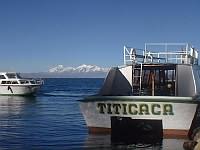 |
|
Lake Titicaca, Peru(3Jun00) |
The icy winds continued, and any hopes I had of a mellow ride soon
faded. At the very least, the terrain was flat and the roads were well
paved. But the instant I hit the border of Bolivia, that too changed. The
pavement stopped exactly at the border, directly under the arch that marked
the entrace to Bolivia: "Welcome to Bolivia, land of rocks and dirt."
The last 13 km of jostling reminded me of how fortunate I had been to
have been on pavement for the past two days. With all of the "off road"
riding I had done in my trip, I was wondering if maybe I should have
brought mountain bike tires in the first place, rather than my
explode-on-impact road tires.
I finally rattled and rolled into Copacabana, my destination for a few
days, just as the sun was setting. Copacabana is a small town on the
southern shore of Lake Titicaca. The town itself was rather plain, except
for the beautiful cathedral, but its tranquility and simplicity also gave
it a certain appeal. It was a great place to rest for the night, and at 10
Bolivianos a night (about US$1.5) it was inexpensive, too. And as if that
wasn´t cheap enough, I couple of Dutch travelers I met in the hostal, Alan
and Vincent, made a homecooked dinner of pasta and tuna on a camping stove,
which we ate on the balcony. Vincent gets my vote for the most outrageous
travel hobby. I thought that my carrying 15 lbs. of camera gear was nuts,
but he was carrying a full set of bagpipes! He even had a bicycle with
him, too.
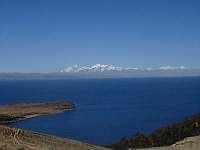 |
|
Isla Del Sol, Peru(3Jun00) |
Lake Titicaca looks very out of place; a bright blue lake in the middle
of a barren, high plain. Just off the coast of Copacabana is a small
island called Isla del Sol, where I went to spend a day hiking. From the
island the view became even more amazing, as you could see the snow capped
Bolivian Andes jutting out in the distance like jagged teeth, a stark
contrast to the yellow and blue of the landscape.
The spectacular scenery continued, as I set out biking the next day, on
my final biking leg to La Paz, two days away. Fortunately, the pavement
returned, but as always was the case, it came at a cost, this time in the
form of more mountains to climb.
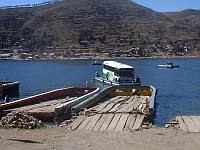 |
The "ferries" of Tiquina
Lake Titicaca, Peru(4Jun00) |
In order to get to La Paz, I needed to cross Lake Titicaca at a small
strait near Tiquina. The crossing was only a km or two across, and there
were regular "ferries" which did the crossing. Calling them ferries is
generous; they were small platform boats about the size of a bus (just
large enough to hold a bus, actually) with loose planks for floorboards.
Normally, only vehicles travel on the platforms, with passengers going in a
separate, more seaworthy boat, but seeing as I was the "driver" of my
vehicle, I had to stay with my bike. I shared the boat with one car, and
once we were loaded, the boatman pushed us off with a long pole, and then
started the outboard motor to get us moving. In the porcess of loading, I
had tossed my gloves into my helmet, but somewhere along the way they fell
out, and straight through a gap in the floorboards and into the lake. I
managed to recover them before they floated off into the lake
On the day I crossed, the weather was nice and the lake calm, but the
previous week, it was rough and windy, and one of the ferries tipped,
sinking a bus and killing four passengers, who had apparently
stowed aboard to avoid paying for the boat ride. Everyone still seemed a
bit edgy about it.
Once safe on the far shore, I started pedaling again. I clearly wasn't
going to make it all the way to La Paz that day, but there really wasn't
anywhere obvious to spend the night. The extreme cold made the idea of
camping extremely unappealing, so I was hoping for a small town somewhere
about half way. As the sun set, however, my situation started to grow more
dire, as it was getting cold and dark, and there was nothing that looked
like a town in sight. With nowhere else to go, I headed towards a group of
buildings and started asking if anyone knew of a place to stay. The
closest place anyone knew of was about 10km in the wrong direction, so I
just kept riding around until I found a dirt road lined with buildings,
which was close enough to a town for me. I asked again and was told that
yes, there was a place to stay; "Go down the street and on the right will
be a green door. Knock on it in a few hours and someone should
answer."
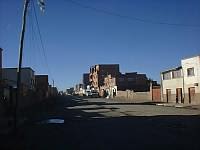 |
|
Las Batallas, Peru(4Jun00) |
The whole thing seemed a bit tentative, but the man with the information
seemed nice enough, and I didn´t really have any other options, so I
decided to go find a place to sit and wait. Further down the road, I
eventually figured out I was indeed in a town, called Las Batallas, which
even had a plaza, so I sat down and tried to write. No sooner than I had
sat down, however, a drunk old man came up to me and started babbling.
Apparently this was full-fledged town, equipped with its own local drunk.
The alcohol made him marginally coherent at best, but he also arrived with a
mouth full of coca leaves, making him sound like a washing machine.
He appeared to be desperately trying to ask me
questions, but all he succeeded in doing was to spit green spittle and coca
leaves on my notebook. I tried politely to tell him I couldn´t understand
a word he was saying, but eventually I had to get up and retreat to another
part of the plaza. He just kept following me, frantically gestering and
mumbling something about his lovely bible collection. I decided to escape
on my bicycle, figuring that I could keep my distance easier by pedaling.
With more time to kill, I started looking for a restaurant, but there was
not a one in town. There weren´t really any stores, either. The only
thing I could find was a man selling salchipapas from a cart. I was running
low on money, and I needed to save some for breakfast, so I had just a
small order; a pile of sausage and fries, neatly wrapped in a paper
cone. The vendor, upon hearing my perdicament with lodging, told me that
if I couldn´t find a place to stay, I should come back, and he would let me
stay in a small storage room.
I headed back to the green door and knocked, but got no reply. The an
who had origianlly directed me there was still nearby, and he suggested I
try the next one over, an equally nondescript metal door. After several
minutes of pounding, an old woman eventually arrived, and she led me to a
room. The room seemed very much like a hotel room, with a separate keyed
lock and everything, but you would never know it from the outside.
Again the cold left me with little desire to do anything but bury myself
under the blankets and go to sleep.
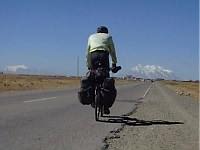 |
On the road
La Paz, Bolivia(5Jun00) |
The next day was my last day of biking, the glorious final lap to cap
off a fabulous journey. I envisioned a triumphant entrance into La Paz -
it was even supposed to be all down hill - but instead it was one of my
worst days of the entire trip. As nondescript as the hotel I had stayed in
was, I had to pay a whopping 20 Bolivianos for the priviledge, leaving me
without a single Boliviano to last me until I could find a bank in La Paz.
That meant no food the entire day. As I slowly rolled out of Las Batallas,
the frozen puddles cracked like glass under the weight of my bike. The
only thing left I had to eat was a package of "sparkies," a type of chewy
candy, and a box of jawbreakers. The 100% sugar diet, on top of no real
dinner the night before, left me weak and demoralized. Not only that, but
the road, which I was expecting to be downhill, was flat all the way until
a couple of km from La Paz. My legs groaned defiantly as I tried to push
myself the last few hours. Finally, I made it to the section of downhill,
and my spirits immediately lifted. La Paz, the world´s highest capital at
somewhere around 13000 ft, is actually set into a large bowl, with a huge
snow-capped mountain looming overhead. The view was awesome, as was the
ten minutes of screaming downhill I had riding into the town center.
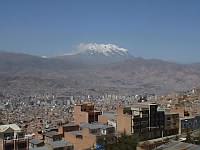 |
The highest capital in the world
La Paz, Bolivia(5Jun00) |
La Paz reminded me a lot of San Francisco, with almost every street
going straight up or straight down. Biking up SF's streets is a challenge,
but with the added altitude of La Paz, it took every ounce of will I had
left to not just get off and walk. When I finally found a hotel, I grudgingly
carried my bike up the one flight of stairs, and I was done! My biking journey
had come to an end. 2300 miles, four months, from La Paz, Mexico to La Paz,
Bolivia. I was an awesome adventure, but I was looking forward to getting
off the bike seat for a while.

